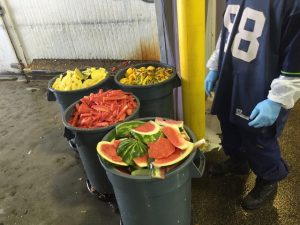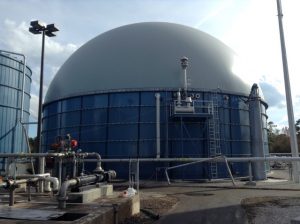News
Part 2: Our Solution – Alternative Recycling Methods for Food Waste

At iSustain, we work with our clients to ensure they are producing as little landfill waste as possible. A recent study shows that food waste has increased by 50% since 1974 and forty percent of the food that is produced in the United States ends up in a landfill. This works out to roughly 365 million pounds of food waste being produced every single day. If food waste is not properly handled, this level is only set to increase. In today’s post, we are going to focus on the importance of keeping as much food waste as possible out of landfills by going over some of the most effective ways to recycle and repurpose food waste. Keep reading below to learn more:
Food Waste can be Used in Many Ways

Each piece of produce is inspected. If it does not meet the company standard, it is thrown away even if it is still perfectly good.
When the average person thinks of food waste, they probably think of all the excess food and expired groceries that they throw out every month. While this is where quite a bit of the food waste produced in the United States originates, tons of food waste is produced every single day during the production phase as well. When a person heads to the grocery store to buy fresh produce, what they don’t see is all of the produce that was rejected from being displayed due to cosmetic imperfections, unsatisfactory levels of ripeness, and a multitude of other factors that cause a grocer to pass over food items. All of this rejected food has to end up somewhere and, with the help of companies such as iSustain, innovative food waste recycling projects are put in place to reduce the amount of food waste that ends up in local and regional landfills.
Some of the ways this food waste is recycled includes:
Animal Feed: One of the best ways to reduce the amount of food waste that is shipped off to landfills is to repurpose the “waste” as animal feed that can be used to supply local and industrial farms with nutrition for their livestock. Once the food waste is taken from the production facility, it is heat-treated and dehydrated and is either mixed with traditional dry feed or directly fed to livestock. It is estimated by the United Nations that if farmers and livestock owners feed their animals with the legally-permissible food waste, enough grain would be freed up to feed an additional three billion people worldwide. Every state has different restrictions when it comes to recycling food waste to turn into animal feed. At iSustain, we make sure to follow all state laws in regard to the recycling of food waste into animal feed, ensuring that our clients have to expend as little effort as possible in making sure that their recycling program is compliant with state and federal law.

Anaerobic Digester
Biogas: When food waste decomposes, it releases methane into the air. Normally, this is not a good thing. Methane is one of the most harmful and potent greenhouse gases that is produced. Luckily, the anaerobic digestion that produces harmful methane gas can be harnessed to generate electricity, fuel for transportation, and heat. Biogas is a renewable and sustainable source of energy that is developed from organic matters such as vegetable and fruit food waste. Engineers have developed an innovative method to capture all of the energy trapped in organic food waste, leaving behind very little waste that must be carted off to landfills. During this recycling process, the food waste is incinerated to produce a crude liquid that can then be turned into biofuel. This biofuel is then treated to produce methane.
Composting: Composting is one of the oldest ways to recycle food waste into a usable and beneficial substance. According to the Environmental Protection Agency, almost 90 percent of the garbage that is thrown away by households, cafeterias, restaurants, and supermarkets is composed of recyclable scrap food. When this waste is sent to the landfill, it not only consumes space but also releases methane gas that contributes to greenhouse emissions. Across the nation, cities have put policies in place to make it easy for people to recycle their food waste by providing regular pickup vehicles that collect the waste and take it to designated composting facilities.
We hope that this blog has been informative and that you have learned more about the alternative recycling methods that are available to those looking to reduce the amount of food waste that is placed in landfills. By taking the time to make the most of the food waste that is produced in this country on a daily basis, we firmly believe that the harmful effects that food waste has on the environment can be mitigated and, in most cases, can be used to produce products that are useful to a wide range of industries. If you are a food manufacturer that is looking to reduce the amount of food waste that your facility sends to landfills, please get in touch with us today at iSustain. We will come to your facility to perform an initial assessment and develop a custom plan to best handle your food waste recycling needs. To set up your assessment, please leave us a message via our contact page or by giving us a call at 423.668.0111.